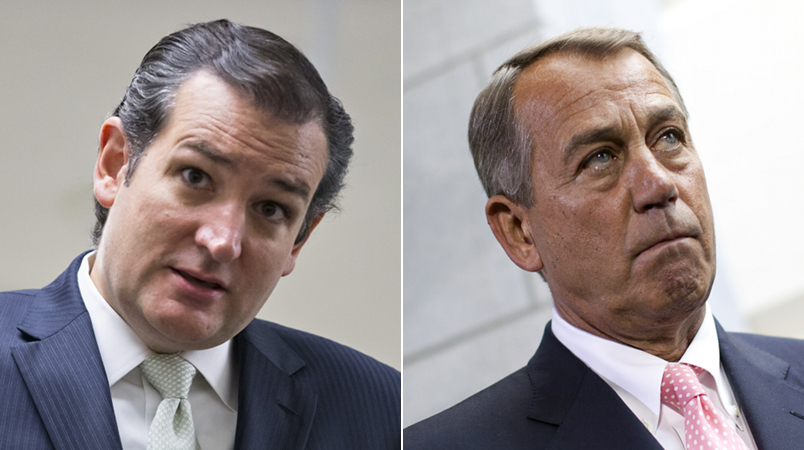WASHINGTON (AP) — A half-dozen Senate races are heightening the struggle between establishment Republicans and tea party campaign operations, threatening to exacerbate conservative divisions this fall and beyond.
Strategists on both sides say several Republican senators are not merely trying to clobber the individuals challenging them from the right in GOP primaries. They also want to undermine, if not cripple, the tea party-affiliated companies helping fund and shape the challengers’ campaigns.
“If we beat enough of these insurgent challengers to incumbents, and get a big winning streak, they might stop doing it,” said Charlie Black, an adviser to top national Republicans for years.
The aggressive strategy carries risks. If conservative voters — many of them embrace tea party principles — feel attacked or insulted by incumbent Republicans’ actions, it could hurt efforts to unite conservatives against Democrats in general elections.
Black said veteran Republican senators such as Mitch McConnell of Kentucky can thread that needle. Exposing the money-making and sometimes hostile-to-Republicans goals of key organizations, he said, should not alienate conservative voters who oppose President Barack Obama and other Democrats.
“These inside-the-Beltway groups don’t have any grassroots component,” Black said. Incumbents such as McConnell, he said, are careful not to criticize groups like Tea Party Patriots, even as they rip into Washington-based firms crucial to insurgents’ campaigns.
Those organizations include the Senate Conservatives Fund, founded by former Sen. Jim DeMint, R-S.C.; FreedomWorks; and the Madison Group. All have called for top Republicans leaders, such as McConnell and House Speaker John Boehner, to be ousted in favor of more ideological candidates who will not compromise with Democrats on taxes, spending and other issues.
These groups’ leaders say McConnell and other incumbents are erring by trying to discredit their GOP challengers so fiercely.
“It seems like the establishment thinks that if they defeat a few conservative candidates, the grassroots will throw up their hands and give up,” said Matt Hoskins of the Senate Conservatives Fund. “But that won’t stop us from fighting for conservative candidates in 2014, 2016 and beyond. We’re not going away.”
Sen. Mike Lee, a tea party Republican, launched this brand of intra-party struggle when he stunned three-term Sen. Bob Bennett in Utah’s 2010 GOP nominating process. Things turned out worse for Republicans in 2012 when a tea party challenger ousted veteran Sen. Richard Lugar in the Indiana primary, only to lose to an underdog Democrat that fall.
Ever since, establishment Republicans have accused DeMint and other activists of willingly electing Democrats by knocking out mainstream GOP candidates who would be stronger campaigners in general elections. Some tea partyers, in return, say longtime Republican leaders like McConnell and Boehner betray conservative principles by working with Democrats on matters such as the debt ceiling.
Summarizing the conflict is a banner in FreedomWorks’ Washington headquarters, where reporters were invited to meet the Republican challengers to McConnell and other incumbents. “Sometimes you have to beat the Republicans before you beat the Democrats,” it says, quoting FreedomWorks President Matt Kibbe.
The Republican Party’s campaign committees for House and Senate races are aggressively defending incumbents, ending a tradition of being mostly hands-off in primaries. They instructed Republicans nationwide to refuse to hire campaign companies that worked for groups like the Senate Conservatives Fund.
The intra-party battles are hottest in Kentucky, Kansas and Mississippi, where Republican senators in their 70s face younger tea party-backed challengers. In all three states, the sitting senators or their allies are striking hard at unproven challengers who might have drawn gentler treatment in the past.
In Kentucky and Kansas, the tea party-backed challengers are struggling to defend themselves against recently divulged old documents — dug up through opposition research — questioning their integrity or judgment.
In Mississippi, allies of Sen. Thad Cochran are harshly criticizing state Sen. Chris McDaniel, his tea party-supported challenger. The accusations are so intense that Gov. Phil Bryant, a Republican backing Cochran, called them disappointing and “just not something that’s necessary.”
The exchanges seem unlikely to cool anytime soon.
“Once people find out a little bit about these candidates, it does a lot to publicly expose the groups that are using them to pervert the definition of conservatism to attack Republicans” and help elect Democrats, said Josh Holmes, an adviser to McConnell and other Republicans.
Republican pollster and consultant Mike McKenna says incumbents such as McConnell are playing a dangerous game. Many tea party-leaning voters will be loyal Republicans, he said, if they feel the GOP establishment respects their concerns and welcomes their involvement.
Instead, Republican incumbents want to beat tea party-backed challengers “to a pulp,” said McKenna, who moves within establishment and tea party circles. “They will do anything, except trying to figure out a way to integrate the tea party guys.”
___
Follow Charles Babington on Twitter: https://twitter.com/cbabington.
Copyright 2014 The Associated Press. All rights reserved. This material may not be published, broadcast, rewritten or redistributed.






